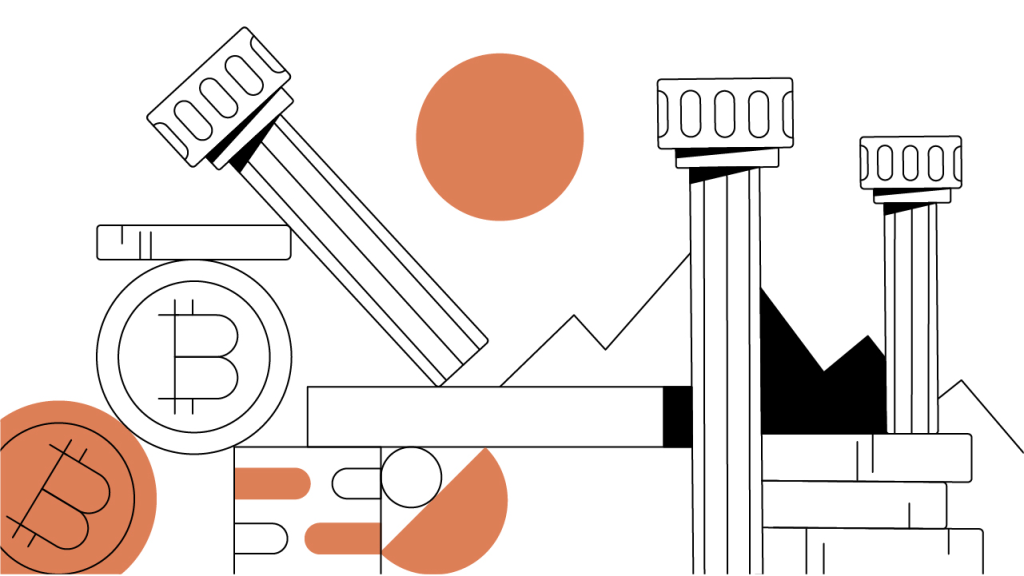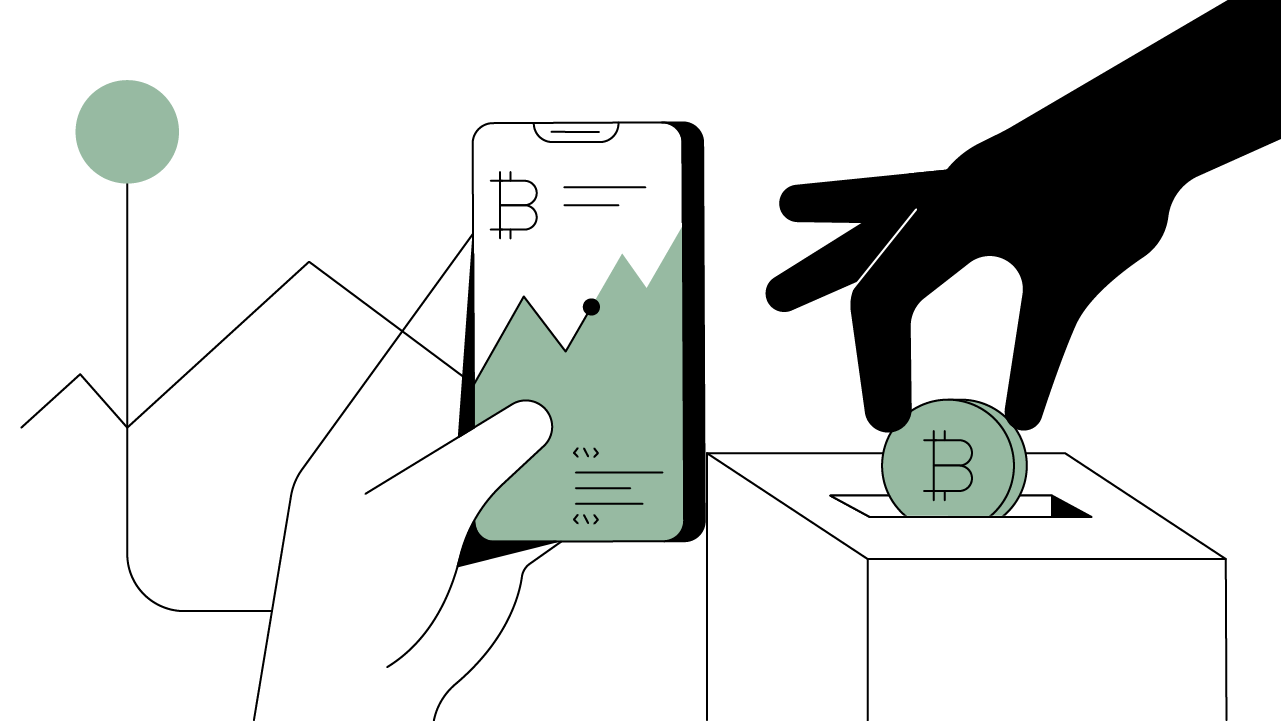Contents
Unbanking the Banked and the Future of Money
DeFi is bringing financial services to the “unbanked” as well as giving the “banked” the option to “unbank.”
Updated May 25, 2021 • 3 min read

Summary
“Banking the unbanked” has become a familiar rallying mission at the intersection of technology and finance. Sectors like financial technology (FinTech) and decentralized finance (DeFi) are creating financial services, instruments, and products that lower barriers to entry, reduce costs, empower users, and utilize emerging technologies like blockchain to reconfigure how finance can function. FinTech and DeFi have also had the effect of “unbanking the banked,” as they represent a departure from total reliance on traditional banking services for people worldwide.
Strategies for Banking the Unbanked
As of 2021, approximately 1.7 billion individuals around the world currently live without access to essential financial services. A lack of banking infrastructure in developing economies is the primary cause for this imbalance, and global access to financial technology (FinTech) is a potential path to enfranchising unbanked populations and creating worldwide financial inclusion. However, the critical importance of inclusion and banking the unbanked through technology often obscures a concurrent related phenomenon: the concept of unbanking the banked.
Achieving basic financial inclusion around the world is critically important. As our financial infrastructure continues to change and improve, many well-connected global citizens are interfacing less with traditional banks and more with a growing constellation of innovative apps, platforms, and emerging technologies.
In particular, the FinTech and decentralized finance (DeFi) sectors are undergoing extraordinary growth and represent a natural evolution of financial products that may very well change the way billions of people interact with money, regardless of how much access they once may have had. For many, these sectors are simply an extension or reinterpretation of modern financial services. But for others they are the first glimpse of a financial world beyond the traditional banking establishment.
Phase 1: Financial Technology (FinTech)
FinTech platforms represent a new era of innovation in finance and the first meaningful departure from total reliance on banking incumbents. Most FinTech companies build platforms that remain dependent on traditional financial infrastructure and seek to improve the delivery and accessibility of traditional financial services. More specifically, FinTech companies ease pain points by lowering minimum investment thresholds, loosening lending requirements, reducing transaction costs, and offering user-friendly experiences on mobile devices. Although not all FinTech projects aim to distance themselves from traditional banks, having diverse options stimulates competition and drives innovation, thus raising standards for financial services across the board.
At the start of 2021, there were more than 20,000 FinTech startups around the globe. These industry leaders continue to solidify sector demand as tens of millions of users move billions of U.S. dollars in value on these platforms.
Investing: Companies operating in this segment make investing more accessible, transparent, and convenient. Some FinTech apps eliminate commission fees in favor of low monthly costs and put your investment strategy on autopilot using robo-investing. For those without a deep understanding of financial instruments, these solutions provide guidance at a fraction of the usual cost. Many of these platforms enable even greater savings by integrating banking, investment, and retirement accounts. In the absence of high commission costs and minimum thresholds, the banked can find reprieve in the FinTech ecosystem.
Banking: Some online-only banking apps are longstanding platforms that emulate the functions of everyday bank accounts without accompanying physical branches. These solutions deliver lower fees, greater transparency, in-app financial management tools, and even early access to direct deposits. FinTech banking apps allow users to transfer funds and conduct daily banking transactions for free in many cases. Many of these platforms also offer their own debit and credit cards — maintaining a familiar, reliable remittance network for the banked, without any physical bank branches.
Payment Networks: Some companies improve on conventional remittance networks. These solutions make sending and receiving payments fast, convenient, and cheap, with virtually nonexistent fees. With some payment networks, for instance, you can receive direct deposits and transfer funds between the network and a traditional bank account at no cost. Some networks also can support mobile payments using a QR code or debit card, while others can integrate with other existing payment apps.
Collectively, these platforms highlight how FinTech can help the banked lessen their reliance on conventional banks while remaining firmly rooted in the financial ecosystem. Compared to traditional banks, leading FinTech platforms put consumers first by lowering costs, providing customized advice, and easing money mobility.
Phase 2: Decentralized Finance (DeFi)
The DeFi ecosystem offers cutting-edge financial products that remove intermediaries, put consumers in control of their finances, and rewire stakeholder incentive models to reward users and empower communities. In harnessing cryptocurrency and digital assets, DeFi diverges from fiat currency and the centralized nature of fiscal and monetary policy, thus creating a whole parallel ecosystem of finance.
Borrowing and Lending: Just as the banked access credit products and save funds to earn interest, the DeFi market also supports borrowing and lending activities. On some DeFi platforms, borrowers can obtain loans denominated in crypto or fiat by providing collateral. Alternatively, lenders can deposit their cryptocurrency in a DeFi platform and earn interest rate returns that often significantly exceed returns offered by conventional banks.
Banking: Maintaining the convenience of daily banking is crucial to unbanking the banked. While earlier iterations of cryptocurrency wallets required a high degree of technological savvy, many are now able to quickly and easily send and accept funds with simple interfaces. Some DeFi companies offer Visa debit cards that work at any retailer that accepts Visa.
Stablecoins: For the banked, the transition to using cryptocurrency may be daunting in the face of volatility. However, stablecoins serve to quell these fears by virtually eliminating sudden price movements. Stablecoins are backed by collateral (fiat, crypto, or commodity) to ensure price stability.
Derivatives: A derivative is a contract between two or more parties — the value of which is based on an underlying, agreed-upon financial asset like a stock, bond, commodity, interest rate, or currency. Derivatives are a crucial component of any mature market as they allow investors to enter long and short positions, providing great market stability and diversification. These solutions can provide exposure to the cryptocurrency asset class without requiring investors to hold actual crypto assets. For the banked, DeFi derivatives are a viable alternative to the financial instruments found in conventional markets.
In combination with several other market segments, the DeFi ecosystem offers a robust menu of financial services, despite its relative infancy and associated risks. As the ecosystem matures, new advancements will only serve to further ease the transition from banked to unbanked.
The Future of FinTech and Decentralized Banking
For many individuals who have only interacted with traditional finance, becoming unbanked can mean migrating away from incumbents for alternatives that deliver functionality, autonomy, and familiarity. FinTech startups fulfill this requirement by building better solutions on existing infrastructure.
For unbanked populations, DeFi solutions present an opportunity to circumvent the barriers imposed by conventional financial service providers and interact with finance on a global scale. As the next step in the evolution of FinTech, DeFi eschews existing framework limitations and instead employs decentralized technology and governance to deliver peer-to-peer (P2P) financial services that not only enhance current standards, but are creating wholly new financial instruments. While the resulting platforms operate in the absence of intermediaries and offer increased autonomy and transparency, they are still nascent financial instruments and may carry increased risks relative to established FinTech or legacy financial services offerings.
Cryptopedia does not guarantee the reliability of the Site content and shall not be held liable for any errors, omissions, or inaccuracies. The opinions and views expressed in any Cryptopedia article are solely those of the author(s) and do not reflect the opinions of Gemini or its management. The information provided on the Site is for informational purposes only, and it does not constitute an endorsement of any of the products and services discussed or investment, financial, or trading advice. A qualified professional should be consulted prior to making financial decisions. Please visit our Cryptopedia Site Policy to learn more.

Is this article helpful?


